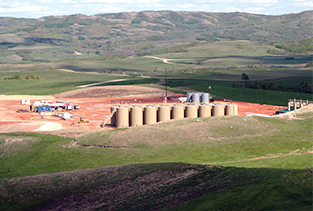
Hydraulic Fracturing Data Management
A proposed new ASTM International data management and reporting standard for shale oil and gas operations, including hydraulic fracturing, is under development. ASTM WK42803, Practice for Data Management and Reporting Associated with Shale Oil and Gas Hydraulic Fracturing Operations, is under the jurisdiction of Subcommittee D18.26 on Hydraulic Fracturing, part of ASTM International Committee D18 on Soil and Rock. The subcommittee has been working closely with several organizations that have already produced guidelines and governmental regulations.
The proposed standard will offer and highlight some data management and reporting best practices tailored to the considerations of the local and regional geologic and hydrogeologic frameworks that impact the resource extraction techniques used within shale oil and gas regions. In the United States, the major states with shale oil and gas activities are Texas (Eagle Ford Shale, Barnett Shale), North Dakota (Bakken Shale), Pennsylvania (Marcellus Shale), Louisiana (Haynesville Shale), Ohio (Utica Shale), and California (Monterey Shale). Internationally, the section also reviewed the European Union and Australia's reporting guidelines for their shale oil and gas operations.
The intent of the proposed standard is to help standardize data; ensure proper data collection during hydraulic fracturing operations; and make data exchanges, extractions and analysis by state agencies, industry and other stakeholders more efficient. The proposed standard will focus on data management and reporting in support of four major areas:
- Chemical disclosure and reporting;
- Water sources, usage, quality and sampling;
- Health and environmental risks; and
- Well integrity and testing.
WK42803 will also strongly consider the importance of state rules and existing IT policies where existing state regulations already govern these operations. Working closely with diverse stakeholders, the task group will develop a standard that provides support for various models and reporting practices that may be useful to each of these stakeholders and the public. It will provide a clear and consistent structure for reporting and best practices that ensure public confidence and awareness of the oil and gas industries' operational extraction process. It will also help further support the identification and capture of important data that may be helpful in current and future research.
Section members agreed that operational due diligence begins before hydraulic fracturing takes place and continues through the life of wastewater disposal and monitoring. The proposed standard will promote an open process of disclosing operational information in the interest of public and environmental health and safety.
All interested parties, particularly those with expertise in petroleum engineering and other fields related to oil and gas operations, are invited to take part in the development of ASTM WK42803.
CONTACT Technical Information: Caryl Alfaro, Earth Resource Systems LLC • Alpharetta, Ga. • Phone: 404-513-5429 | ASTM Staff: Robert Morgan • Phone: 610-832-9732 | Upcoming Meeting: Jan. 26-28, 2014 • January Committee Week • Houston, Texas
 SN Home
SN Home Archive
Archive Advertisers
Advertisers Masthead
Masthead RateCard
RateCard Subscribe
Subscribe Email Editor
Email Editor